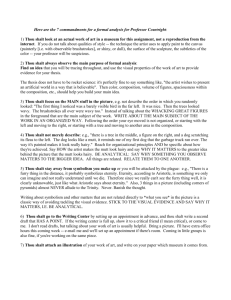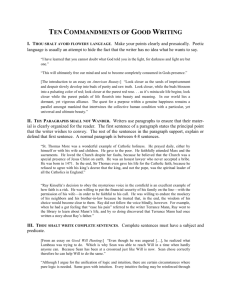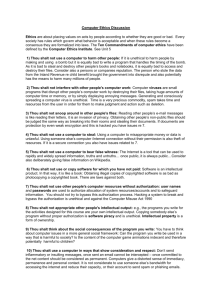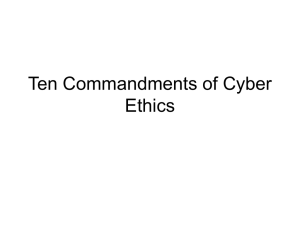Chemistry 30: Course Outline
advertisement
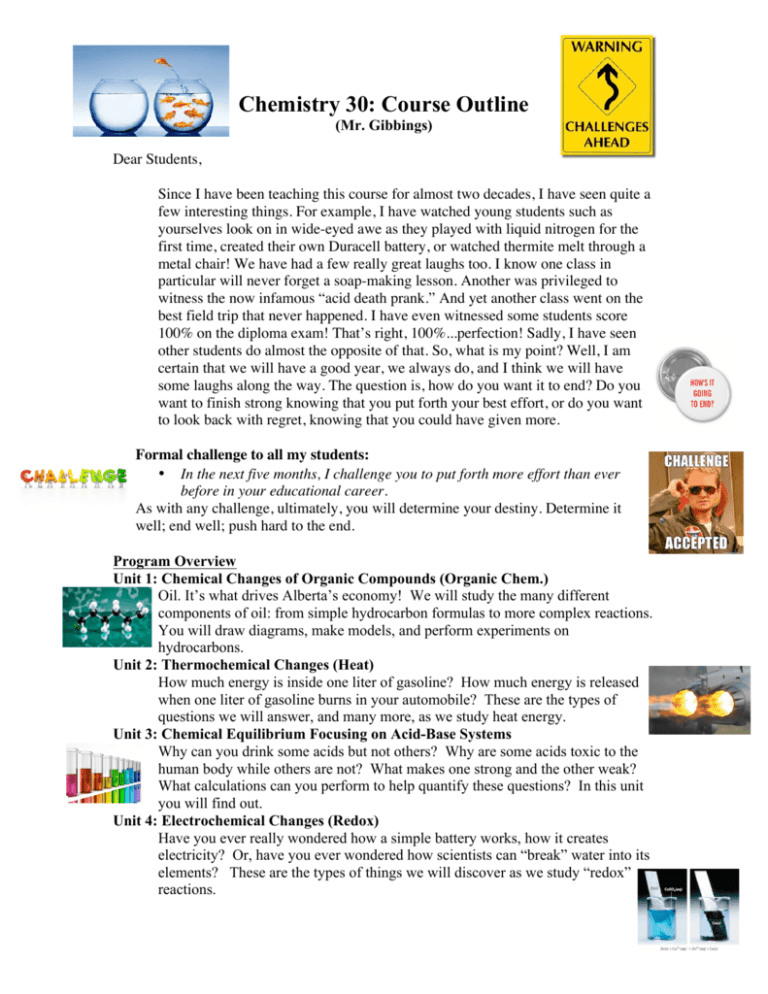
Chemistry 30: Course Outline (Mr. Gibbings) Dear Students, Since I have been teaching this course for almost two decades, I have seen quite a few interesting things. For example, I have watched young students such as yourselves look on in wide-eyed awe as they played with liquid nitrogen for the first time, created their own Duracell battery, or watched thermite melt through a metal chair! We have had a few really great laughs too. I know one class in particular will never forget a soap-making lesson. Another was privileged to witness the now infamous “acid death prank.” And yet another class went on the best field trip that never happened. I have even witnessed some students score 100% on the diploma exam! That’s right, 100%...perfection! Sadly, I have seen other students do almost the opposite of that. So, what is my point? Well, I am certain that we will have a good year, we always do, and I think we will have some laughs along the way. The question is, how do you want it to end? Do you want to finish strong knowing that you put forth your best effort, or do you want to look back with regret, knowing that you could have given more. Formal challenge to all my students: • In the next five months, I challenge you to put forth more effort than ever before in your educational career. As with any challenge, ultimately, you will determine your destiny. Determine it well; end well; push hard to the end. Program Overview Unit 1: Chemical Changes of Organic Compounds (Organic Chem.) Oil. It’s what drives Alberta’s economy! We will study the many different components of oil: from simple hydrocarbon formulas to more complex reactions. You will draw diagrams, make models, and perform experiments on hydrocarbons. Unit 2: Thermochemical Changes (Heat) How much energy is inside one liter of gasoline? How much energy is released when one liter of gasoline burns in your automobile? These are the types of questions we will answer, and many more, as we study heat energy. Unit 3: Chemical Equilibrium Focusing on Acid-Base Systems Why can you drink some acids but not others? Why are some acids toxic to the human body while others are not? What makes one strong and the other weak? What calculations can you perform to help quantify these questions? In this unit you will find out. Unit 4: Electrochemical Changes (Redox) Have you ever really wondered how a simple battery works, how it creates electricity? Or, have you ever wondered how scientists can “break” water into its elements? These are the types of things we will discover as we study “redox” reactions. Evaluation Each unit will consist of: Formative Knowledge Quizzes Application Quizzes Unit Tests Teacher Final(s) (old diploma questions) Teacher Mark nil 15% 15% 35% 35% ------100% Because this is a diploma class, all of the above only counts for 50% of your grade. Of course, the other 50% comes with the dreaded diploma exam. Teacher Mark Diploma Exam Final Mark 50% 50% -------100% Test Re-take Policy • In my class it is possible to re-take exams…but, the price must be paid. • So what is the price? o You have to show me that you have completed every piece of homework that I have assigned AND o You must get a minimum of 90% on the “Knowledge Quizzes” Knowledge Quizzes • Throughout each unit I will be giving “Knowledge Quizzes” • I believe these are critical to forming the basic knowledge you will need to be successful in my class. • If you score in the 80’s to 90’s on these quizzes you will have the basic knowledge to earn 65% on the diploma. • That is not a typo. Acquiring the basic knowledge probably gets you a 65% on the diploma. Applying the knowledge correctly is what bumps you up into the 80% range. Application Quizzes • These are diploma type questions designed to test the combination of knowledge and application • These separate the full-grown men from little the boys, and the big strong women from the little girls. The 10 “Chemandments” 1. Thou shalt be prepared. This means that you will be on time and have all necessary materials to do the work in my class including text, data book, calculator, notes, etc. 2. Thou shalt show respect. You will show respect to all other students. This means you should not belittle (mock) anyone or attempt to damage self-esteem in any other way. This world is full of destroyers, be a builder–build others up, don’t tear them down. You also need to respect me as your teacher. I have your best interests at heart; I have a job to do, and I intend on doing it. Wasting my time with disruptive behavior or not doing your homework shows disrespect for everything that school stands for. You will also be respectful to janitors, administrators and school property. 3. Thou shalt not touch anything that is of limits. My lecture table, the L-shaped desk, all lab equipment in the cabinets and shelves, and the chemical storage room are off limits. All games are also off limits (ie. basketball, hockey stick etc.) 4. Thou shalt not ask to leave the room very often. You should use the bathroom at the breaks or at lunch. The same goes for the phone. Of course there are some exceptions to this rule, but for the most part you will stay in this room until the bell rings. 5. Thou shalt attend class everyday. Like all diploma courses, chemistry 30 is so challenging that you need all the help you can get. Missing even one class will hurt your mark. I have never seen a student miss a bunch of classes and do well in the end. 6. Thou shalt not ask to have a class party. I like fun just as much as you, but we have little time to waste. If you feel like we have time for a party, I probably haven’t been working you hard enough and will make the appropriate adjustments. 7. Thou shalt receive one free data book. The next one costs you one dollar. 8. Thou shalt prepare for the diploma. As I type this, I look at the words and realize they don’t convey the importance I need them to. Students may not realize how vital preparation is, and fewer still even know how to prepare properly and thoroughly. You should be working on chemistry for a half an hour each and every night, Monday to Friday, and perhaps Saturday. And cramming won’t work; it is the rotting fruit of the poorly prepared. 9. Thou shalt realize that your grades (and the teacher) are not like the internet, an iPod, or a cell phone. As great as these things are (I own both an iPod and a cell phone and love them) they convey the idea that we get what we want, when we want it. This is called instantaneous gratification. In today’s society, if you want information, you “Google” for it and it appears. If you want a song, you download and enjoy. If you want to purchase something you go to eBay today, and it appears on your doorstep tomorrow. But you can’t do that with your marks. Earning good grades takes a lot of time, energy, and diligence–5 months of it in fact. Also, I can’t mark your tests instantly. You will have to wait an excruciating day before you get them back. And finally, don’t bring your iPods, cell phones, etc. to class. They are wonderful tools, but they will not help you with your chemistry work, hence they are distractions, nothing more. 10. Thou shalt have a positive attitude. Whether you think you will enjoy this class or not, you are right. Stages of Development In all life, there are sequential stages of growth and development. A child learns to turn over, to sit up, to crawl, and then to walk and run. Each step is important and each one takes time. No step can be skipped. This is true in all phases of life, in all areas of development, whether it be learning to play the piano or communicate effectively with a working associate. It is true with individuals, with marriages, with families, and with organizations. …And even if we understand it, to accept it and live in harmony with it are even less common and more difficult. Consequently, we sometimes look for a shortcut, expecting to be able to skip some of these vital steps in order to save time and effort and still reap the desired result. But what happens when we attempt to shortcut a natural process in our growth and development? If you are only an average tennis player but decide to play at a higher level in order to make a better impression, what will result? Would positive thinking alone enable you to compete effectively against a professional? What if you were to lead your friends to believe you could play the piano at concert hall level while your actual present skill was that of a beginner? The answers are obvious. It is simply impossible to violate, ignore, or shortcut this development process. It is contrary to nature, and attempting to seek such a shortcut only results in disappointment and frustration. On a ten-point scale, if I am at level two in any field, and desire to move to level five, I must first take the step toward level three. “A thousand mile journey begins with the first step” and can only be taken one step at a time. …if you don’t pay the price day in and day out, you never achieve true mastery of the subjects you study or develop an educated mind. Did you ever consider how ridiculous it would be to try to cram on a farm–to forget to plant in the spring, play all summer and then cram in the fall to bring in the harvest? The farm is a natural system. The price must be paid and the process followed. You always reap what you sow; there is no shortcut. Stephen R. Covey, 7 Habits, p. 36, 37 & 22
